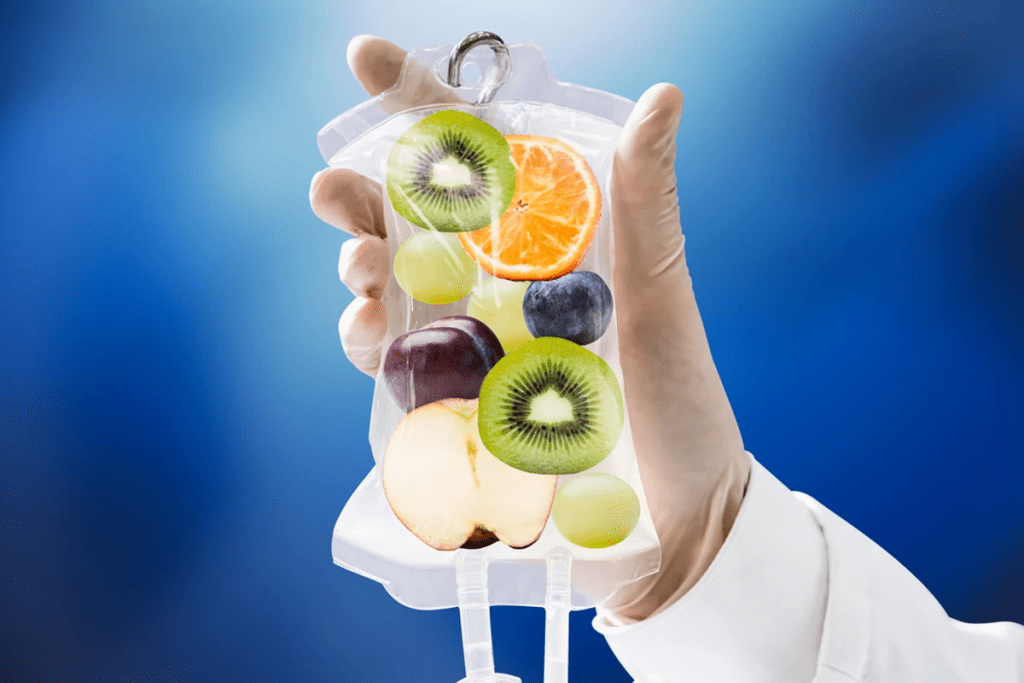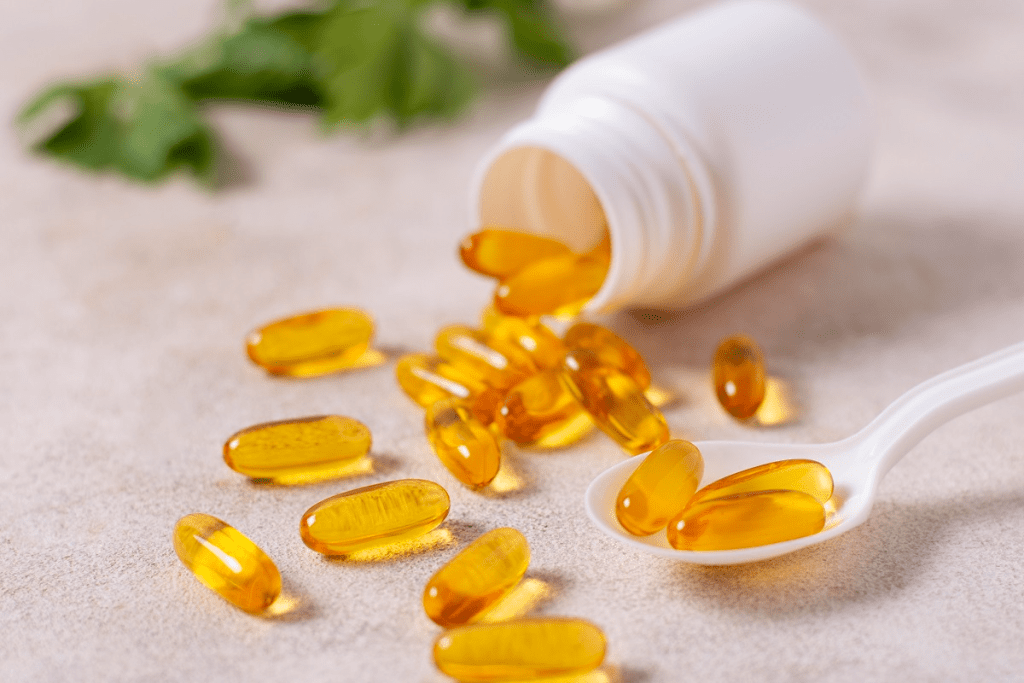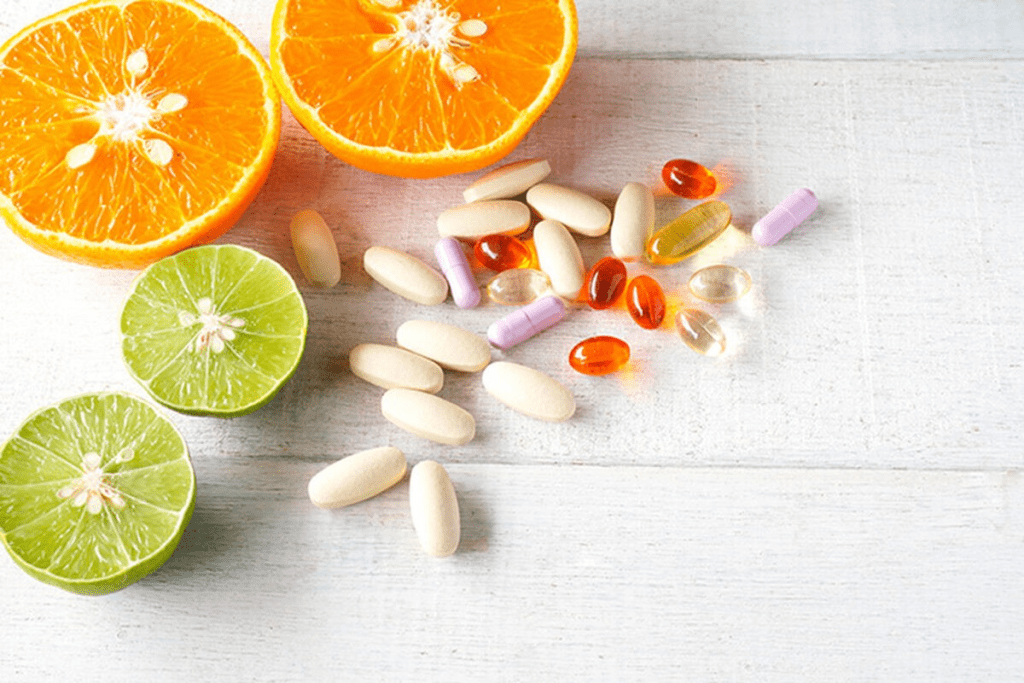Last Updated on October 31, 2025 by

Keeping your bladder healthy is key to feeling good. Some vitamins play an important role in maintaining bladder function. Studies show that vitamins C and A can greatly help with common bladder problems.
Many people wonder, “does vitamin C make you pee? Research suggests that vitamin C, being water-soluble, may increase urination slightly as the body flushes out the excess. This process can actually help cleanse the bladder and urinary tract, supporting overall health.
We focus on good nutrition for bladder wellness, which includes the right mix of bladder-supporting vitamins like C and A. Including these nutrients in your diet can promote a healthy urinary system and reduce discomfort caused by bladder irritation.
Vitamins are key to bladder health, helping with both function and repair. We’ll look at how vitamins impact bladder function and the role of antioxidants in fixing the bladder.

Vitamins are vital for bladder health. Vitamins C and D, along with magnesium, are great for the bladder. Vitamin C, for example, fights off oxidative stress with its antioxidant powers.
Research shows vitamin C can lessen the impact of urinary tract infections and other bladder problems.
Vitamins affect bladder function in many ways. They can change muscle tone, nerve function, and bladder tissue health. A lack of certain vitamins can weaken bladder muscles, causing incontinence or bladder control issues.
Antioxidants like vitamins C and A are key in fixing the bladder. They fight oxidative stress and inflammation. Oxidative stress happens when free radicals outnumber antioxidants, damaging cells.
In bladder health, oxidative stress can lead to interstitial cystitis and bladder cancer. Vitamin C neutralizes free radicals, reducing oxidative stress and improving bladder health. Vitamin A helps regenerate bladder tissue and keeps the urinary tract lining strong.
Understanding vitamins and antioxidants in bladder health shows why a balanced diet is important. Eating enough vitamins C and D, along with other nutrients, is vital for bladder function and overall health.
Vitamin C is important for bladder health and preventing infections. We look at how it helps the bladder, where to find it in food, and the science behind its benefits.
Vitamin C is in many foods that are easy to add to your diet. Citrus fruits like oranges and grapefruits are full of it. Also, broccoli, strawberries, and bell peppers are good sources. Eating these foods can keep your vitamin C levels up, which is good for your bladder.
Eating foods high in vitamin C can help with bladder problems. Adding these foods to your diet can help support your bladder.

The daily vitamin C amount you need changes with age and other factors. Adults should aim for 65 to 90 milligrams a day. But, some research shows higher amounts might help with bladder health too.
To keep your bladder healthy, follow the daily recommended amount. But, your needs might be different. Talking to a doctor can help figure out the right amount of vitamin C for you.
Studies show vitamin C might help prevent urinary tract infections (UTIs). Vitamin C’s antioxidant properties help keep the bladder lining strong. This could lower the chance of getting infections.
More research is needed on vitamin C for bladder repair. But, current studies suggest it can help improve bladder health. Adding vitamin C to your diet or taking supplements could be part of a good bladder care plan.
Knowing how vitamin C affects urination helps us choose the right supplements. We’ll look at how vitamin C intake and bladder function are linked. We’ll talk about the good and bad sides of taking supplements.
Vitamin C is good for fighting off infections and boosting the immune system. But, taking too much can make you pee more often. This is something to think about, if you already have bladder problems.
Studies show that too much vitamin C can make you pee more. How much it affects you depends on how much you take and how your body reacts.
Taking vitamin C can also change how acidic your urine is. When vitamin C breaks down, it can make your urine more acidic. This might be a problem for people with certain bladder issues, like interstitial cystitis.
For some, taking vitamin C can make bladder problems worse, like in people with interstitial cystitis. High amounts of vitamin C can irritate the bladder, causing more pain and needing to pee more.
It’s important to start with a small dose and talk to a doctor before taking supplements. Watching how your body reacts to vitamin C is key to keeping your bladder healthy.
Vitamin A is key for bladder health, helping with tissue repair. It’s a fat-soluble vitamin that keeps the bladder lining strong and working right.
Vitamin A stops cells from dying off too fast and slows down tumor growth. This helps keep bladder cells healthy and lowers the chance of bladder problems.
Mechanisms of Action: Vitamin A works in many ways to protect bladder cells. It changes how genes work and cuts down on oxidative stress. This keeps bladder cells safe from harm.
You can get Vitamin A from different foods, which is good for your bladder. Here are some Vitamin A-rich foods:
Vitamin A also fights inflammation, which is good for your bladder. It helps keep the urinary system healthy by reducing inflammation.
Benefits for Bladder Health: Vitamin A’s anti-inflammatory effects help with conditions like interstitial cystitis. It also helps with other inflammatory bladder issues.
Other vitamins and nutrients are key for bladder health, aside from Vitamin C and A. A full plan for bladder care includes knowing how different vitamins and minerals help.
B vitamins are important for health, including the urinary system. B12 is key for making fatty acids and energy, affecting the bladder. A lack of B12 can cause incontinence and bladder problems. Getting enough B vitamins through food or supplements helps the bladder.
Experts say B vitamins are vital for the nervous system, which controls the bladder.
Vitamin D is also important for bladder health. Research links Vitamin D deficiency to pelvic floor disorders, like incontinence. Keeping Vitamin D levels up is key to urinary health.
Magnesium and zinc are minerals that help the bladder. Magnesium controls bladder muscle function, preventing spasms and incontinence. Zinc boosts the immune system and fights off infections. Getting enough of these minerals is important for bladder health.
Omega-3 fatty acids fight inflammation, which helps the bladder. Less inflammation means fewer symptoms of interstitial cystitis. Adding omega-3 foods or supplements to your diet supports bladder health.
Exploring diet, nutrition, and bladder health shows that a multi-faceted approach is needed. By using a variety of vitamins and minerals, people can improve their bladder health and overall well-being.
Vitamins are getting more attention for treating bladder problems. They play a big role in keeping the bladder healthy. Some vitamins can help with different bladder issues.
UTIs are common, hitting women hard. Vitamin C can make urine more acidic, stopping bacterial growth. It also boosts the immune system, lowering infection risk.
OAB makes you feel like you need to pee right away. It’s not always clear why it happens. But some vitamins can help manage its symptoms.
B Vitamins support the nervous system, easing OAB symptoms. Eating foods rich in B Vitamins helps. Magnesium and zinc supplements can also help.
IC causes bladder pain and pressure. Vitamin therapy might help. Vitamin D has anti-inflammatory effects, which can help with IC.
Bladder cancer needs thorough treatment. Research shows high-dose Vitamin C might help with treatment. It could make other treatments work better.
More studies are needed to understand Vitamin C’s role in bladder cancer treatment. But, the early results are encouraging. Always talk to a doctor about treatment options.
Keeping your bladder healthy is key to feeling good overall. We’ve seen how important vitamins are for bladder health and repair. A diet full of vitamins and minerals is essential.
Vitamins like Vitamin C and Vitamin A are vital for bladder function. Eating foods high in these vitamins can boost bladder health.
People with bladder problems might find vitamins helpful. Vitamin C can ease UTI symptoms, and Vitamin A helps with interstitial cystitis.
We stress the need for a balanced diet for bladder health. Knowing how vitamins help and adding them to your meals is a smart move. It keeps your bladder and overall health in check.
By focusing on bladder health and using the right vitamins, like those for bladder control, you can live better. It helps avoid bladder problems and improves your quality.
Vitamins C and A are great for bladder health. Vitamin C helps fight off urinary tract infections. Vitamin A helps the bladder heal and grow back.
Yes, some vitamins like vitamin C can make you pee more often. Taking too much vitamin C can make your urine more acidic. This might make bladder problems worse for some people.
Yes, vitamin C can help stop urinary tract infections. It makes your urine more acidic. This helps stop bacteria from growing.
Vitamin A is key for bladder health. It helps the bladder heal and grow back. It also fights inflammation, keeping the bladder healthy.
Yes, other vitamins and nutrients are important too. B vitamins, vitamin D, magnesium, zinc, and omega-3 fatty acids help keep the bladder working right. They also keep your urinary system healthy.
Vitamins can be part of treating bladder problems. They help with urinary tract infections, overactive bladder, interstitial cystitis, and bladder cancer.
Eating a balanced diet is key for bladder health. Include fruits, vegetables, whole grains, and lean proteins. Foods high in vitamin C and A are best for the bladder.
We think getting vitamins from food is better than supplements. A balanced diet gives you all the vitamins and nutrients your body needs. They work together to keep you healthy.
Yes, taking too much of some vitamins can make bladder problems worse. It’s important to get the right amount of vitamins to avoid problems.
Subscribe to our e-newsletter to stay informed about the latest innovations in the world of health and exclusive offers!